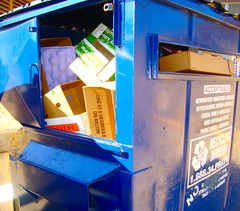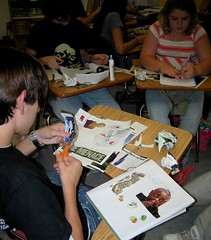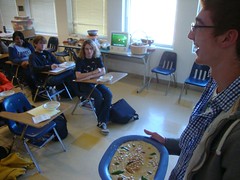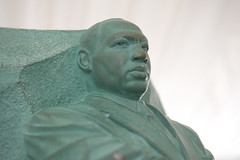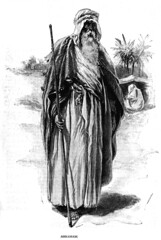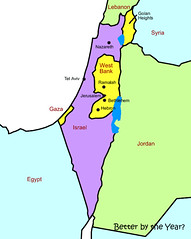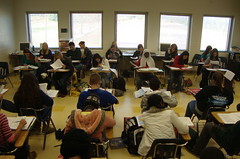Writes city council member Michael Corbin, "I encourage you, your class and those who read your blog to email EACH MEMBER of the Shreveport City Council supporting our current single-stream recycling program. We all recognize the importance of recycling and it is important at this time to let our City leaders know it is important to the citizens."
Tuesday, January 25, 2011
Sunday, January 23, 2011
"Lawrence of Arabia:" 85 questions that help illuminate the movie
The award-winning movie Lawrence of Arabia is based on Lawrence's chronicle of war and politics, the Seven Pillars of Wisdom.
1) British movie director David Lean won 7 Oscars for the movie, which runs over 200 minutes, or a good 2 hours. T / F
2) The movie opens in England, 1935. Motorcycles (Triumph, BSA, etc) were a symbol of British success in the Industrial Revolution. Enjoy the brief but loving camera attention given to Lawrence's British v-twin cycle, the Brough Superior. It was called "the Rolls Royce of motorcycles." In what nation is the Rolls Royce manufactured? a) France b) Germany c) England.
3) The Lawrence funeral service is in St. Paul’s Cathedral, London, a burial place reserved for national heroes. Remarks heard in the crowd indicate that L. was a complex fellow and not a perfect hero. T / F
4) Cairo, Cartography department, British Army, about 1914: in several ways L. stands out from the soldiers with which he is serving. a) articulacy b) ribaldry c) bestiality.
What is cartography? the making of a) menus b) posters c) maps.
5) What are the dates of WWI? Name the nations aligned with the British. Name the countries working with the Germans.
1914 - 1918; US enters war in 1917. Brits and French vs. Germans and Austria-Hungary.
6) Your dossier: a) portfolio b) genealogy c) association memberships.
7) What language has L. studied in addition to his mother tongue and French? a) Arabic b) German c) Chinese.
8) In Arabia there is a conflict between the nomadic, tribal Bedouin peoples and the Turks, rulers of the Turkish Ottoman Empire - which includes Arabia. Who’s on the German side? a) Bedouins b) Turks.
9) “The Officer’s Mess” is a term for
a) a carelessly kept meeting room or
b) the lounge area for the commissioned soldiers.
10) Arabian tribes are led by the wise, if weary,
a) Prince Feisal of Mecca b) Lloyd George c) Woodrow Wilson.
11) What is the attitude of L’s desert guide toward the British officer’s pistol carried by L.? a) curiosity b) extreme desire c) unconcern.
How does L. use the pistol in making his way amongst the Bedouins?
a) let's make a deal b) bribery c) bridge-building.
12) The Arabic word for canyon, usually a dry, rocky area between mesas, is “wadi.”
The wadi is where Arabs have typically made their settlements. T / F
What do the existence of these stone canyons say about the ancient geography of this region? a) centuries of wind erosion b) ancient waterways c) glaciation.
13) The Harish versus the Hazimi: murderous tribal warfare is a historic part of life in the vast desert. T / F
14) What kind of vessel is used to bring up water from the deep well in the desert? a) Goat skin b) wooden bucket c) woven-palm sort of basket-bucket.
15) Translate "Peace (be with you)” into Arabic: a) shalom b) salaam
c) shazam.
16) L. sings a WWI era ditty called “The Man who Broke the Bank at Monte Carlo.” Where is Monte Carlo? a) Mediterranean b) Persian Gulf c) North Sea. In gambling, what does it mean to “break the bank”?
17) A Britishism for being posted to a unit is “seconded.” T / F
18) What is meant by the term biplane? a) engine "blips" b) two wings
c) plane can be flown either right-side-up or upside-down.
19) Where did the Turks get airplanes in 1916? Not “at the store.” a) Germans b) French c) British.
20) What sound can Arabs seem not to be able to pronounce consistently? a) L
b) Y c) Ch.
21) In the caravan some camels are surmounted by small, square tent enclosures. Who is in such a tent? a) wives of the emir b) children of the royal family c) pet monkeys.
22) “Recite, then, as much of the __ as may be easy for you ... and seek ye the forgiveness of God. Verily, God is forgiving, merciful ...” These are the opening words of the a) Qu’ran b) Bible c) Baghavad Gita .
The scene in Feisel’s tent is unusually respectful of Muslims. Why do I say “unusually”? a) Western lack of respect for Muslims b) low Muslim self-concept c) camels ate all the dates.
23) Lawrence quotes the Qu'ran. How would he know such material?
a) movie producer explained it to him b) his momma c) his Oxford education.
24) In 1915 the top British priority in the Mid East was protection of a waterway important to their shipping and movement of warships. What is the name of this key passage, which connects the Mediterranean to the Indian Ocean? a) Arabian Sea b) Panama Canal c) Suez Canal.
25) In explaining to Feisel the reason for Britain’s worldwide power, the British officer puts an emphasis on England's __ . a) technology b) discipline c) skill d) wealth.
26) In the early 1900’s the city at the center of Islamic art, business and scholarship was not Mecca, nor Cairo. It was the capital of Syria:
a) Medina b) Damascus c) Jerusalem .
27) According to Feisel, do Arabs love the desert? No. Then what do they love? a) fountains and gardens b) mountains c) ships and oysters.
28) Feisel refers to the Islamic golden age. About what centuries did the peak of their achievements occur? a) 750 to 1050 b) 1400 - 1500 c) 1800 - 1900.
29) At the desert’s edge Lawrence spends a night concentrating on the Arab dilemma in their feckless fight against the Turks. He has a breakthrough. What is his solution? a) attack from the sea
b) attack at night c) attack from the desert.
30) A cruel and terrible desert must be crossed by the Bedouin.
The desert is the a. Sahara b. Rub al Kali c. Arezy an Nefud.
31) “The Howeitat are brigands.” Write a synonym for brigand.
a) gourmets b) swift of movement c) bandits.
32) What 3 nations has Lawrence visited thus far in the movie? a) England, Egypt, Syria b) England, France, Egypt c) England, Egypt, Saudi Arabia.
33) Can a man claiming to perform a miracle be judged guilty of blasphemy? By definition, miracles are created by __. a) God b) Moses c) Abraham.
34) The boys who become Lawrence’s servants are unsuitable, he is told, because they are “outcast and parentless.” What would we call them? a) bastards b) idiots c) dispossessed.
35) What is a shilling? a) currency b) to sell something via lies and trickery c) a pint of ale.
36) “Allah favors the compassionate.” Offer a synonym for compassionate. a) healthy b) benevolent c) all-knowing.
37) During the desert crossing, Lawrence makes a point of using the precious water for shaving. Why does he insist on shaving?
a) code of the British officer b) OCD c) his beard is patchy and unappealing.
38) Which character has 2 African bodyguards? a) Lawrence
b) Sherif Ali c) General Dryden.
39) "In sh’Allah" is a frequent interjection and means: a) "If God is willing" b) "God be with you" c) "I believe in God" d) "God is merciful."
40) Gasim the Bedouin falls off his camel and is lost in the desert during the night. a) Lawrence stubbornly insists on going back to try to find him b) Lawrence accepts that being lost is Gasim's fate
c) Lawrence is unable to decide on the best course of action and talks about what might be done for days and days.
41) In the desert the Bedouins find a place surrounded by trees where their camels can drink. It is called an __ . a) aquifer b) fountain
c) oasis.
What kind of trees are those? a) cocoanut palms b) date palms c) oasis palms .
42) An argument about the role of fate is waged between Lawrence and the Arabs.
The Englishman’s key phrase is “Nothing is __.” a) written b) known
c) seen before dawn.
43) Lawrence’s father, he explains, is Sir Thomas Chapman.
Yet his father and mother are a) not married b) not suited c) illiterate.
44) Lawrence is awarded the robes of a tribesman for his valorous service. Somehow, he finds the indigenous garments a) uncomfortable
b) appealing c) murderous.
45) After some tricky negotiations, Auda Abu Talib of the Howeitat says “Dine with me in __ Ruum!” a) Wadi b) Musa c) Caribbean.
46) The camel driver’s stick is often used for another purpose.
a) mini tent pole b) back scratcher c) cleaning boots.
47) Auda Abu Talib says, “’The Arabs,’ What tribe is that?” What does he imply? a) there is no unity among the Arab tribes b) he is hard of hearing c) there is not enough money on the table.
48) What is a British guinea? a) small pig b) hen c) currency.
49) What city will be attacked by the combined tribes in a surprise raid?
a) Cairo b) Medina c) Aqaba.
It lies on what body of water? a) Gulf of Aqaba b) Gulf of Suez
c) Gulf of Aden.
50) When the troops leave the wadi, the women watching them emit a high-pitched scream as encouragement. What is that called? a. ovulation b. ululation c. trepidation d. insubordination.
51) “The law says the man must die.” This is based on a code associated with a historic leader of Mesopotamia. a) Cyrus b) Hammurabi c) Darius.
52) In the tribal dispute - which almost begins a blood feud - who is the condemned murderer? Who is the executioner? What irony is there?
53) The Turks at Aqaba outnumber and outgun the Arabs but the Bedouin raiders are successful. What is their great advantage?
54) Lawrence declares he will cross the badlands of the Sinai Peninsula. Where is he going?
55) The servant boy Daud dies in the desert in a most unexpected way. What is it?
56) When a camel lies down, which set of legs folds first?
57) The spooky, abandoned buildings encountered on the edge of the Sinai actually lie beside the __ __ .
58) “Bringing a ‘wog’ into the Officer’s Mess” is offensive to many soldiers. Explain.
59) “Undisciplined, unpunctual, untidy; knowledge of languages, music, literature, etc.” Who is being described?
60) In WWI the British attacked the Turkish-held Mid East and drove the Turks from the holy city of __.
61) “You acted without orders.”
“Shouldn’t an officer use their initiative at all times?” Explain.
62) Lawrence leads Bedouin riders in swift attacks on the Turks that depend on surprise for success. Today that’s called __ warfare (French word).
63) The Bedouins are wary of being partners with the British. They believe that the British are thinking, “Let the Arabs drive out the Turks, then we’ll take over.”
T / F
64) Intermission is another opportunity for the director to air his score over a dark screen. What does this imply?
65) The American reporter called Bentley in the movie is another true element in the Lawrence story. The journalist’s real name is Lowell Thomas. What happens as a result of Bentley’s stories and photos?
66) Lawrence uses his expertise in explosives against the Turkish __.
67) What is the Geneva Convention? a) guidelines for humane treatment of prisoners during war. b) a secret system used by the people of Switzerland.
68) What happens to the Bedouin army after the looting of Turkish trains?
69) Why does Lawrence shoot and kill his servant and friend Farraj?
70) Lawrence allows himself to be captured by the Turks in Deraa. Why?
71) Is there such a thing as a fair-haired, blue-eyed person of Middle Eastern blood?
Is a Circassian the same as a Caucasian?
72) Write a brief description of the location of the Caucasian Mountains.
73) On the eve of the battle for Jerusalem Lawrence has a breakdown. What action does he take?
74) The Sykes-Picot Treaty is an agreement at the end of WWI that proclaims that 2 nations will divide the control of the Middle East. Which European nations took over the defeated Turkish Empire?
75) Is Lawrence guilty of having told the Bedouins “half lies” about their future and control of their ancient lands? Was he guilty of naiveté?
76) What happened to Lawrence while being held by the Turks in Deraa?
77) On the eve of the attack on the Turks in Damascus, people notice that Lawrence is a changed man. Describe his attitude.
78) Lawrence’s personal troops are hired soldiers. The word for commercial soldiers is __.
79) General Allenby is chauffeured in what brand of British auto?
80) Who wins the race to conquer the Turks in Damascus? a) the Arabs b) the British.
81) The tribal people form a government in Damascus. It is called the __ National Council.
82) The Arab armies prove incapable of governing Damascus. What governance factors flummox the Arabs?
83) The Arab tribal leaders leave Damascus and return to their homes in __.
84) What factor in British life is repulsive to Lawrence in his return to Britain?
85) Lawrence did not want to be famous as a successful soldier. His desire was to be recognized as a significant writer. Did he reach his goal?
86) At what age does Lawrence die?
1) British movie director David Lean won 7 Oscars for the movie, which runs over 200 minutes, or a good 2 hours. T / F
2) The movie opens in England, 1935. Motorcycles (Triumph, BSA, etc) were a symbol of British success in the Industrial Revolution. Enjoy the brief but loving camera attention given to Lawrence's British v-twin cycle, the Brough Superior. It was called "the Rolls Royce of motorcycles." In what nation is the Rolls Royce manufactured? a) France b) Germany c) England.
3) The Lawrence funeral service is in St. Paul’s Cathedral, London, a burial place reserved for national heroes. Remarks heard in the crowd indicate that L. was a complex fellow and not a perfect hero. T / F
4) Cairo, Cartography department, British Army, about 1914: in several ways L. stands out from the soldiers with which he is serving. a) articulacy b) ribaldry c) bestiality.
What is cartography? the making of a) menus b) posters c) maps.
5) What are the dates of WWI? Name the nations aligned with the British. Name the countries working with the Germans.
1914 - 1918; US enters war in 1917. Brits and French vs. Germans and Austria-Hungary.
6) Your dossier: a) portfolio b) genealogy c) association memberships.
7) What language has L. studied in addition to his mother tongue and French? a) Arabic b) German c) Chinese.
8) In Arabia there is a conflict between the nomadic, tribal Bedouin peoples and the Turks, rulers of the Turkish Ottoman Empire - which includes Arabia. Who’s on the German side? a) Bedouins b) Turks.
9) “The Officer’s Mess” is a term for
a) a carelessly kept meeting room or
b) the lounge area for the commissioned soldiers.
10) Arabian tribes are led by the wise, if weary,
a) Prince Feisal of Mecca b) Lloyd George c) Woodrow Wilson.
11) What is the attitude of L’s desert guide toward the British officer’s pistol carried by L.? a) curiosity b) extreme desire c) unconcern.
How does L. use the pistol in making his way amongst the Bedouins?
a) let's make a deal b) bribery c) bridge-building.
12) The Arabic word for canyon, usually a dry, rocky area between mesas, is “wadi.”
The wadi is where Arabs have typically made their settlements. T / F
What do the existence of these stone canyons say about the ancient geography of this region? a) centuries of wind erosion b) ancient waterways c) glaciation.
13) The Harish versus the Hazimi: murderous tribal warfare is a historic part of life in the vast desert. T / F
14) What kind of vessel is used to bring up water from the deep well in the desert? a) Goat skin b) wooden bucket c) woven-palm sort of basket-bucket.
15) Translate "Peace (be with you)” into Arabic: a) shalom b) salaam
c) shazam.
16) L. sings a WWI era ditty called “The Man who Broke the Bank at Monte Carlo.” Where is Monte Carlo? a) Mediterranean b) Persian Gulf c) North Sea. In gambling, what does it mean to “break the bank”?
17) A Britishism for being posted to a unit is “seconded.” T / F
18) What is meant by the term biplane? a) engine "blips" b) two wings
c) plane can be flown either right-side-up or upside-down.
19) Where did the Turks get airplanes in 1916? Not “at the store.” a) Germans b) French c) British.
20) What sound can Arabs seem not to be able to pronounce consistently? a) L
b) Y c) Ch.
21) In the caravan some camels are surmounted by small, square tent enclosures. Who is in such a tent? a) wives of the emir b) children of the royal family c) pet monkeys.
22) “Recite, then, as much of the __ as may be easy for you ... and seek ye the forgiveness of God. Verily, God is forgiving, merciful ...” These are the opening words of the a) Qu’ran b) Bible c) Baghavad Gita .
The scene in Feisel’s tent is unusually respectful of Muslims. Why do I say “unusually”? a) Western lack of respect for Muslims b) low Muslim self-concept c) camels ate all the dates.
23) Lawrence quotes the Qu'ran. How would he know such material?
a) movie producer explained it to him b) his momma c) his Oxford education.
24) In 1915 the top British priority in the Mid East was protection of a waterway important to their shipping and movement of warships. What is the name of this key passage, which connects the Mediterranean to the Indian Ocean? a) Arabian Sea b) Panama Canal c) Suez Canal.
25) In explaining to Feisel the reason for Britain’s worldwide power, the British officer puts an emphasis on England's __ . a) technology b) discipline c) skill d) wealth.
26) In the early 1900’s the city at the center of Islamic art, business and scholarship was not Mecca, nor Cairo. It was the capital of Syria:
a) Medina b) Damascus c) Jerusalem .
27) According to Feisel, do Arabs love the desert? No. Then what do they love? a) fountains and gardens b) mountains c) ships and oysters.
28) Feisel refers to the Islamic golden age. About what centuries did the peak of their achievements occur? a) 750 to 1050 b) 1400 - 1500 c) 1800 - 1900.
29) At the desert’s edge Lawrence spends a night concentrating on the Arab dilemma in their feckless fight against the Turks. He has a breakthrough. What is his solution? a) attack from the sea
b) attack at night c) attack from the desert.
30) A cruel and terrible desert must be crossed by the Bedouin.
The desert is the a. Sahara b. Rub al Kali c. Arezy an Nefud.
31) “The Howeitat are brigands.” Write a synonym for brigand.
a) gourmets b) swift of movement c) bandits.
32) What 3 nations has Lawrence visited thus far in the movie? a) England, Egypt, Syria b) England, France, Egypt c) England, Egypt, Saudi Arabia.
33) Can a man claiming to perform a miracle be judged guilty of blasphemy? By definition, miracles are created by __. a) God b) Moses c) Abraham.
34) The boys who become Lawrence’s servants are unsuitable, he is told, because they are “outcast and parentless.” What would we call them? a) bastards b) idiots c) dispossessed.
35) What is a shilling? a) currency b) to sell something via lies and trickery c) a pint of ale.
36) “Allah favors the compassionate.” Offer a synonym for compassionate. a) healthy b) benevolent c) all-knowing.
37) During the desert crossing, Lawrence makes a point of using the precious water for shaving. Why does he insist on shaving?
a) code of the British officer b) OCD c) his beard is patchy and unappealing.
38) Which character has 2 African bodyguards? a) Lawrence
b) Sherif Ali c) General Dryden.
39) "In sh’Allah" is a frequent interjection and means: a) "If God is willing" b) "God be with you" c) "I believe in God" d) "God is merciful."
40) Gasim the Bedouin falls off his camel and is lost in the desert during the night. a) Lawrence stubbornly insists on going back to try to find him b) Lawrence accepts that being lost is Gasim's fate
c) Lawrence is unable to decide on the best course of action and talks about what might be done for days and days.
41) In the desert the Bedouins find a place surrounded by trees where their camels can drink. It is called an __ . a) aquifer b) fountain
c) oasis.
What kind of trees are those? a) cocoanut palms b) date palms c) oasis palms .
42) An argument about the role of fate is waged between Lawrence and the Arabs.
The Englishman’s key phrase is “Nothing is __.” a) written b) known
c) seen before dawn.
43) Lawrence’s father, he explains, is Sir Thomas Chapman.
Yet his father and mother are a) not married b) not suited c) illiterate.
44) Lawrence is awarded the robes of a tribesman for his valorous service. Somehow, he finds the indigenous garments a) uncomfortable
b) appealing c) murderous.
45) After some tricky negotiations, Auda Abu Talib of the Howeitat says “Dine with me in __ Ruum!” a) Wadi b) Musa c) Caribbean.
46) The camel driver’s stick is often used for another purpose.
a) mini tent pole b) back scratcher c) cleaning boots.
47) Auda Abu Talib says, “’The Arabs,’ What tribe is that?” What does he imply? a) there is no unity among the Arab tribes b) he is hard of hearing c) there is not enough money on the table.
48) What is a British guinea? a) small pig b) hen c) currency.
49) What city will be attacked by the combined tribes in a surprise raid?
a) Cairo b) Medina c) Aqaba.
It lies on what body of water? a) Gulf of Aqaba b) Gulf of Suez
c) Gulf of Aden.
50) When the troops leave the wadi, the women watching them emit a high-pitched scream as encouragement. What is that called? a. ovulation b. ululation c. trepidation d. insubordination.
51) “The law says the man must die.” This is based on a code associated with a historic leader of Mesopotamia. a) Cyrus b) Hammurabi c) Darius.
52) In the tribal dispute - which almost begins a blood feud - who is the condemned murderer? Who is the executioner? What irony is there?
53) The Turks at Aqaba outnumber and outgun the Arabs but the Bedouin raiders are successful. What is their great advantage?
54) Lawrence declares he will cross the badlands of the Sinai Peninsula. Where is he going?
55) The servant boy Daud dies in the desert in a most unexpected way. What is it?
56) When a camel lies down, which set of legs folds first?
57) The spooky, abandoned buildings encountered on the edge of the Sinai actually lie beside the __ __ .
58) “Bringing a ‘wog’ into the Officer’s Mess” is offensive to many soldiers. Explain.
59) “Undisciplined, unpunctual, untidy; knowledge of languages, music, literature, etc.” Who is being described?
60) In WWI the British attacked the Turkish-held Mid East and drove the Turks from the holy city of __.
61) “You acted without orders.”
“Shouldn’t an officer use their initiative at all times?” Explain.
62) Lawrence leads Bedouin riders in swift attacks on the Turks that depend on surprise for success. Today that’s called __ warfare (French word).
63) The Bedouins are wary of being partners with the British. They believe that the British are thinking, “Let the Arabs drive out the Turks, then we’ll take over.”
T / F
64) Intermission is another opportunity for the director to air his score over a dark screen. What does this imply?
65) The American reporter called Bentley in the movie is another true element in the Lawrence story. The journalist’s real name is Lowell Thomas. What happens as a result of Bentley’s stories and photos?
66) Lawrence uses his expertise in explosives against the Turkish __.
67) What is the Geneva Convention? a) guidelines for humane treatment of prisoners during war. b) a secret system used by the people of Switzerland.
68) What happens to the Bedouin army after the looting of Turkish trains?
69) Why does Lawrence shoot and kill his servant and friend Farraj?
70) Lawrence allows himself to be captured by the Turks in Deraa. Why?
71) Is there such a thing as a fair-haired, blue-eyed person of Middle Eastern blood?
Is a Circassian the same as a Caucasian?
72) Write a brief description of the location of the Caucasian Mountains.
73) On the eve of the battle for Jerusalem Lawrence has a breakdown. What action does he take?
74) The Sykes-Picot Treaty is an agreement at the end of WWI that proclaims that 2 nations will divide the control of the Middle East. Which European nations took over the defeated Turkish Empire?
75) Is Lawrence guilty of having told the Bedouins “half lies” about their future and control of their ancient lands? Was he guilty of naiveté?
76) What happened to Lawrence while being held by the Turks in Deraa?
77) On the eve of the attack on the Turks in Damascus, people notice that Lawrence is a changed man. Describe his attitude.
78) Lawrence’s personal troops are hired soldiers. The word for commercial soldiers is __.
79) General Allenby is chauffeured in what brand of British auto?
80) Who wins the race to conquer the Turks in Damascus? a) the Arabs b) the British.
81) The tribal people form a government in Damascus. It is called the __ National Council.
82) The Arab armies prove incapable of governing Damascus. What governance factors flummox the Arabs?
83) The Arab tribal leaders leave Damascus and return to their homes in __.
84) What factor in British life is repulsive to Lawrence in his return to Britain?
85) Lawrence did not want to be famous as a successful soldier. His desire was to be recognized as a significant writer. Did he reach his goal?
86) At what age does Lawrence die?
Wednesday, January 19, 2011
5 Pillars of Islam illustrations due Fri; 12 pts
To learn the basics of Islam is to begin with the 5 Pillars.
- state each item.
- add a colorful illustration (sketch or clip).
- attribution / documentation (citing sources) in bottom right corner.
- colorful map of the Arabian peninsula: bodies of water, Yemen, Saudi Arabia.
In notebook, as ever.
Late: lose 5 pts.
- state each item.
- add a colorful illustration (sketch or clip).
- attribution / documentation (citing sources) in bottom right corner.
- colorful map of the Arabian peninsula: bodies of water, Yemen, Saudi Arabia.
In notebook, as ever.
Late: lose 5 pts.
Feast of the Middle East, Fri, Jan 28; 12 pts.
Students will bring easy-to-prepare dishes to class that provide classmates with a taste of Middle Eastern dishes. 12 pts.
The cuisine region actually extends from Greece through Turkey, Syria, Lebanon, Palestine/Israel, Jordan, Iraq, the Arabian peninsula and Egypt.
Recommended:
- hummus
- tzatziki
- pita bread
- dates
- non-flavored (natural) yogurt
- baklava
- tea
- coffee
- dolmas / dolmades
- additional items you may suggest.
Students who do are not able to bring food have an alternative:
write a comparison essay on 2 specific foods of the Mid East. Plase see me on the topic.
The cuisine region actually extends from Greece through Turkey, Syria, Lebanon, Palestine/Israel, Jordan, Iraq, the Arabian peninsula and Egypt.
Recommended:
- hummus
- tzatziki
- pita bread
- dates
- non-flavored (natural) yogurt
- baklava
- tea
- coffee
- dolmas / dolmades
- additional items you may suggest.
Students who do are not able to bring food have an alternative:
write a comparison essay on 2 specific foods of the Mid East. Plase see me on the topic.
MLK jr. quiz
1. MLK grew up during the Great Depression. T / F
2. He was, politically speaking, a __ .
a) conservative b) liberal c) radical d) libertarian
3. Away from leading political forces, being a __ was his job. a) clergyman b) US Representative c) pharmaceutical sales
d) attorney.
4. His religious denomination: a) Methodist b) Catholic c) Unitarian d) Baptist.
5. His birthplace was a large city in __. a) Alabama b) Mississippi c) Georgia d) South Caroolina.
6. He graduated with a Bachelors degree from a) Harvard b) Columbia c) Howard Univ d) Morehouse College.
7. In the 1930's he and his father changed their names to Martin Luther King. His original name was a) Lawrence b) Millard c) Cedric d) Michael.
8. The King family name change took place after a family visit to the European nation of __, which was Martin Luther's home.
a) France b) Germany c) England d) Belgium.
9. King used the teachings of Mohandas K. __ as a guide to non-violent protest.
a) Patel b) Singh c) Ghali d) Gandhi.
10. In 1955, King went to Montgomery, Ala, to lead a boycott of the public bus system. This protest was initiated by the civil disobedience of a) Claudette Colvin
b) Howard Thurmann c) Coretta King d) Rosa Parks.
11. In King's era, racist policies and statutes were known as __ __ laws. a) Black face b) Colored peoples c) Jim Crow d) utterly ridiculous.
12. King helped establish one of these: a) NAACP - National Assoc for the Advancement of Colored People b) SCLC - Southern Christian Leadership Council
c) ACLU - American Civil Liberties Union.
13. In the 1960's peaceful public protest often resulted in __ , as directed by governors, mayors and police. a) honors b) arrests c) lawsuits.
14. The civil rights movement protest technique called a "sit-in" was often used to protest segregation of a a) schools b) public swimming pools c) restaurants d) barber & beauty shops.
15. King's telephones (at home or in a hotel) were "tapped" by the FBI under the orders of president a) Eisenhower b) Nixon c) Kennedy d) Johnson.
16. In Southern states during the 1950's and 60's most black people were severely discouraged from __ . a) voting b) moving from location to location c) moving from job to job d) Having large families.
17. The great civil rights protest march held in Washington, DC, in which the "I have a dream" speech was given by King: a) 1953 b) 1963 c) 1973 d) 1983.
18. Racial integration in US public schools was technically ended in 1954, with the Brown v Board of Education decision, but in fact it continued to 1964, when Congress passed the Civil Rights Act of 1964. T / F
19. Prior to the Civil Rights Act of 1964 public facilities in many states were segregated under the "separate but equal" judgment. That included all but one of these: a) schools b) restaurants c) US Army d) doctor's offices.
20. King got a PhD from Boston University in theology. In the 1980s, according to Wikipedia, an inquiry concluded that portions of his dissertation had been improperly taken from other sources. He was guilty of __
a) calumny b) sedition c) controversy d) plagiarism.
21. He was assassinated in 1968 on the balcony of a motel in the city of __. a) Memphis b) Chicago c) New Orleans d) St Louis.
2. He was, politically speaking, a __ .
a) conservative b) liberal c) radical d) libertarian
3. Away from leading political forces, being a __ was his job. a) clergyman b) US Representative c) pharmaceutical sales
d) attorney.
4. His religious denomination: a) Methodist b) Catholic c) Unitarian d) Baptist.
5. His birthplace was a large city in __. a) Alabama b) Mississippi c) Georgia d) South Caroolina.
6. He graduated with a Bachelors degree from a) Harvard b) Columbia c) Howard Univ d) Morehouse College.
7. In the 1930's he and his father changed their names to Martin Luther King. His original name was a) Lawrence b) Millard c) Cedric d) Michael.
8. The King family name change took place after a family visit to the European nation of __, which was Martin Luther's home.
a) France b) Germany c) England d) Belgium.
9. King used the teachings of Mohandas K. __ as a guide to non-violent protest.
a) Patel b) Singh c) Ghali d) Gandhi.
10. In 1955, King went to Montgomery, Ala, to lead a boycott of the public bus system. This protest was initiated by the civil disobedience of a) Claudette Colvin
b) Howard Thurmann c) Coretta King d) Rosa Parks.
11. In King's era, racist policies and statutes were known as __ __ laws. a) Black face b) Colored peoples c) Jim Crow d) utterly ridiculous.
12. King helped establish one of these: a) NAACP - National Assoc for the Advancement of Colored People b) SCLC - Southern Christian Leadership Council
c) ACLU - American Civil Liberties Union.
13. In the 1960's peaceful public protest often resulted in __ , as directed by governors, mayors and police. a) honors b) arrests c) lawsuits.
14. The civil rights movement protest technique called a "sit-in" was often used to protest segregation of a a) schools b) public swimming pools c) restaurants d) barber & beauty shops.
15. King's telephones (at home or in a hotel) were "tapped" by the FBI under the orders of president a) Eisenhower b) Nixon c) Kennedy d) Johnson.
16. In Southern states during the 1950's and 60's most black people were severely discouraged from __ . a) voting b) moving from location to location c) moving from job to job d) Having large families.
17. The great civil rights protest march held in Washington, DC, in which the "I have a dream" speech was given by King: a) 1953 b) 1963 c) 1973 d) 1983.
18. Racial integration in US public schools was technically ended in 1954, with the Brown v Board of Education decision, but in fact it continued to 1964, when Congress passed the Civil Rights Act of 1964. T / F
19. Prior to the Civil Rights Act of 1964 public facilities in many states were segregated under the "separate but equal" judgment. That included all but one of these: a) schools b) restaurants c) US Army d) doctor's offices.
20. King got a PhD from Boston University in theology. In the 1980s, according to Wikipedia, an inquiry concluded that portions of his dissertation had been improperly taken from other sources. He was guilty of __
a) calumny b) sedition c) controversy d) plagiarism.
21. He was assassinated in 1968 on the balcony of a motel in the city of __. a) Memphis b) Chicago c) New Orleans d) St Louis.
Monday, January 17, 2011
Abraham the Patriarch / Ibrahim the Prophet
Abraham the Patriarch / Ibrahim the Prophet
Abraham (Ibrāhīm) is a figure in the Torah, Bible, and Quran, whom Jewish, Christian and Muslim believers regard as the founding patriarch of the Israelites, Arabs and Edomite peoples, says Wikipedia.org.
According to the Torah, Abraham was brought by God from Mesopotamia to the land of Canaan, around 2000 BCE[1] There entered into a covenant: in exchange for sole recognition of Yahweh as supreme universal deity and authority, Abraham will be blessed with innumerable progeny.
His original name was Abram, meaning "exalted father". For the latter part of his life, he was called Abraham, "father of many (nations)" per Genesis 17:5, although it does not have any literal meaning in Hebrew.[1]
Judaism, Christianity and Islam are sometimes referred to as the "Abrahamic religions", because of the role Abraham plays in their holy books.
In the Jewish tradition, he is called Avraham Avinu or "Abraham, our Father." God promised Abraham that through his offspring, all the nations of the world will come to be blessed (Genesis 12:3), interpreted in Christian tradition as a reference to Christ.
Jews, Christians, and Muslims consider him father of the people of Israel through his son Isaac (cf. Exodus 6:3, Exodus 32:13).
For Muslims, he is a prophet of Islam and the ancestor of Muhammad through his other son, Ishmael.
Thus Abraham offers a bit of common ground for the otherwise conflicted peoples of the Mid East.
The Land that is Holy to 3 religions: Palestine / Israel
A never-ending source of world-engaging conflict lies at the southeastern end of the Mediterranean. The land was called Palestine for some 20 centuries - at least since the Roman conquest.
In 1947 Jewish forces prevailed over Arab forces and most of the land was renamed Israel - and dedicated as a Jewish state. That name, Israel, is part of the region's ancient history.
Besides Palestine, names used to refer to all or part of this land, says Wikipedia, include Canaan, Greater Israel, Greater Syria, the Holy Land, Iudaea Province, Judea,[23] Israel, "Israel HaShlema", Kingdom of Israel, Kingdom of Jerusalem, Land of Israel (Eretz Yisrael or Ha'aretz), Zion and others.
Our study will inquire into these themes -
- Differences and similarities between Judaism, Christianity and Islam.
- Reasons for continuing violent conflict.
- The story of Jerusalem.
In 1947 Jewish forces prevailed over Arab forces and most of the land was renamed Israel - and dedicated as a Jewish state. That name, Israel, is part of the region's ancient history.
Besides Palestine, names used to refer to all or part of this land, says Wikipedia, include Canaan, Greater Israel, Greater Syria, the Holy Land, Iudaea Province, Judea,[23] Israel, "Israel HaShlema", Kingdom of Israel, Kingdom of Jerusalem, Land of Israel (Eretz Yisrael or Ha'aretz), Zion and others.
Our study will inquire into these themes -
- Differences and similarities between Judaism, Christianity and Islam.
- Reasons for continuing violent conflict.
- The story of Jerusalem.
World geography, second semester, begins with the Middle East
Units of particular focus in the second semester -
- The Middle East (Israel, Palestine, Iraq, Iran/Persia) and North Africa
- Continent of Africa, continent of Africa: West Africa (Senegal, Nigeria) vs East Africa (Kenya,
- Central Asia: India, Pakistan and Vietnam
- East Asia: China & Japan
- Oceania: Australia, Philippines, New Zealand
Skills -
- Reading comprehension - of articles and multiple-choice questions.
- Writing with detail.
- Information management: notes, web site print-out, etc.
- The Middle East (Israel, Palestine, Iraq, Iran/Persia) and North Africa
- Continent of Africa, continent of Africa: West Africa (Senegal, Nigeria) vs East Africa (Kenya,
- Central Asia: India, Pakistan and Vietnam
- East Asia: China & Japan
- Oceania: Australia, Philippines, New Zealand
Skills -
- Reading comprehension - of articles and multiple-choice questions.
- Writing with detail.
- Information management: notes, web site print-out, etc.
Subscribe to:
Posts (Atom)
